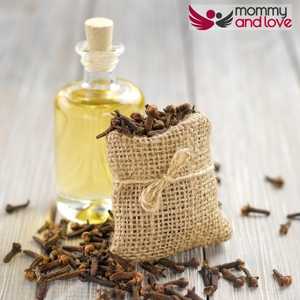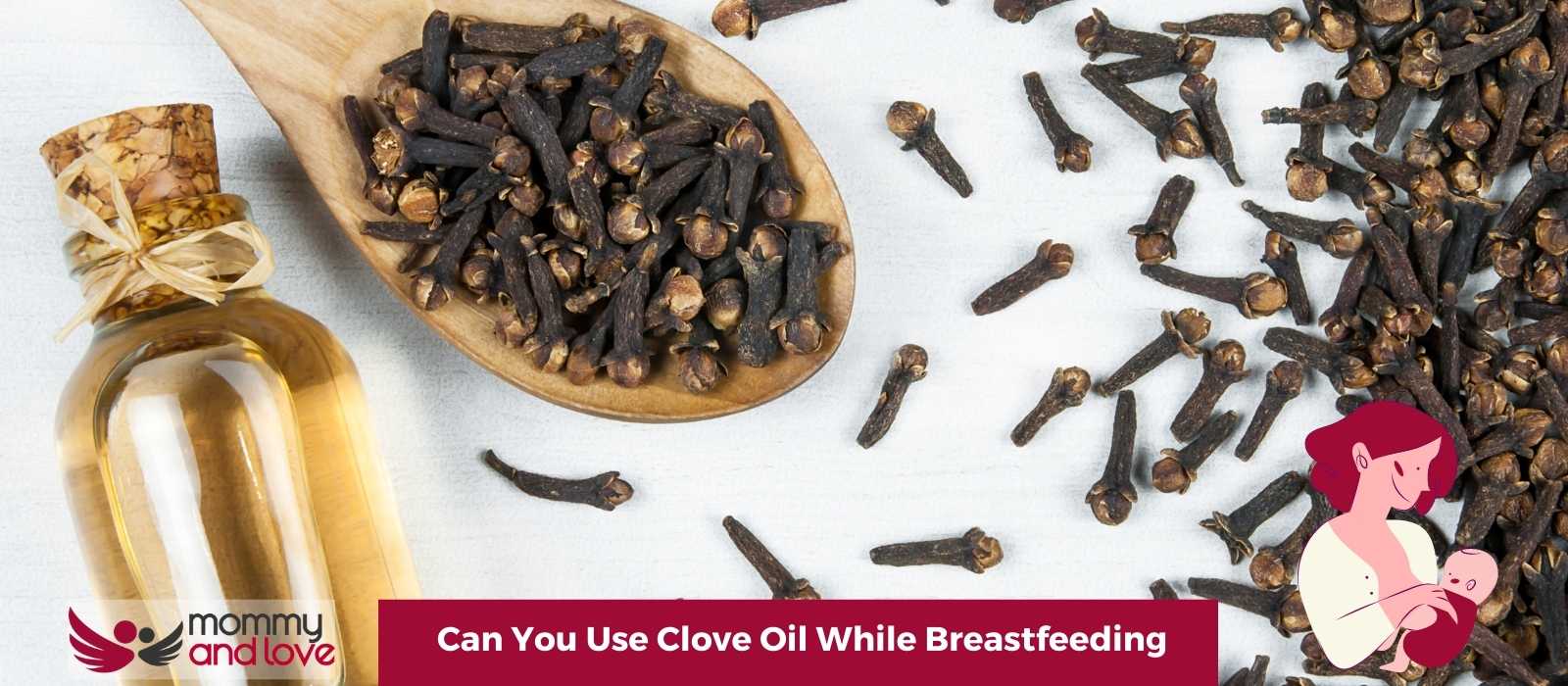Clove oil works wonders as a natural remedy for the worst tooth pain imaginable, but it also has other potential benefits. But is using clove oil while breastfeeding safe?
Before using this oil, it’s important to understand the potential risks and benefits. This post will explore its possible uses even when breastfeeding and what you need to know before using it.
What is Clove Oil?

In its purest form, it is made through the steam distillation of cloves. It has a characteristic spicy smell and is amber in color.
Clove supplements and oil can be used to treat a variety of health-related issues. However, whether the use of this oil is safe while breastfeeding or not is still unknown.
What Are the Potential Side Effects of Clove Oils?
Be aware of the side effects of using clove oil. Possible allergic reactions include difficulty breathing, hives and swelling of the face, lips, tongue or throat.
Side effects may vary depending upon the type and amount of oil used. This is especially true if you have an allergy to eugenol or other chemicals.
Applying this oil directly to the skin may cause mild skin irritation, redness or a warm sensation.
If you have a reaction after applying this oil, stop use immediately and contact your doctor for further instructions. This is particularly true if your symptoms do not subside quickly after ceasing the use of this essential oil.
What Are the Concerns of Using Clove Oils in Breastfeeding Moms?
Breastfeeding is such a wonderful bonding experience. When you’re breastfeeding, you have to make sure you’re giving your baby such amazing nutrition. But there are several concerns to keep in mind, including clove oil’s potential toxicity and skin absorption.
It’s important to note that essential oils, while natural, can be dangerous if misused. If you are interested in their uses while breastfeeding, speak with your doctor first.
Since they are not regulated by the FDA and there has been no official medicinal plant research done on their safety while breastfeeding, it is best to avoid the use of these products unless directed to do so by a medical professional.
Neither medical claims nor anecdotal evidence can be used as reliable sources when considering taking an essential oil.
Oils that may be harmful should never be applied topically or taken internally. They should not be used around infants or children and should always be used in a well-ventilated area and stored out of reach of children.
Never ingest essential oils because most of them are for topical use only. However, some safe oils such as those made by Young Living Oils are safe to ingest.
Can Cloves Affect Breastfeeding?

Ingesting a clove or two has little to no effect on breastfeeding. However, ingestion of more than that amount might cause gastrointestinal distress.
As a result, avoid overindulging in your favorite spice when breastfeeding.
Does Clove Oil Affect Breastmilk?
Clove oil is a popular home remedy for a variety of ailments, but some women worry about whether it is safe to use while breastfeeding. Clove oil does not appear to have any effect on breastmilk supply or quality, however, there are insufficient studies available to prove this.
Always avoid contact with your little one’s skin and have a word with your doctor if in doubt.
Essential Oils That Are Safe to Use While Breastfeeding
Here are oils that are safe to use while breastfeeding (some increases milk supply!):
Fennel Seed
Fennel seed is a carminative herb and is generally safe while breastfeeding. It relieves gas, bloating, and abdominal pain. It also acts as an anti-spasmodic to help reduce the cramping of the muscles in the intestines and abdomen that can make your baby uncomfortable.
In terms of its effect on breastmilk, fennel essential oil has been shown to increase milk supply while simultaneously increasing levels of melatonin in breastmilk. This can help your baby sleep longer, which gives you some much-needed rest too!
You can also apply it topically with other carrier oils such as jojoba oil, just avoid the nipple area though.
Clary Sage
Clary sage is used for sore neck muscles. It is a uterine tonic as well as a galactagogue (an herb that promotes lactation). Studies have shown that clary sage increases prolactin levels in nursing mothers which helps increase milk supply so you don’t run dry at the worst time possible.
While there have been studies showing this benefit for mothers who use clary sage during pregnancy there have not been any studies showing its safety during breastfeeding so it may be best to use it with caution if your doctor recommends it or you are using other herbs to improve your milk supply such as fenugreek or blessed thistle tea.
Dill
Dill is a spice that has been used for centuries to promote digestive health. Dill contains calcium, magnesium, iron, and manganese, which are all necessary for breastfeeding moms.
It is also a powerful antioxidant, meaning it helps increase the body’s immune system and its defense against diseases. In addition to using dill in cooking (dill butter is an excellent choice), you can also add it to your essential oil diffuser and with citrus combined for constant benefits. But when using in a room with a newborn, start slow with just a drop.
Basil
Basil is aromatic and has a spicy flavor. The scent of basil does not diminish during pregnancy, but the flavor of foods can change during breastfeeding.
It is thought to be a galactagogue and can be used to improve milk supply. It’s great for cooking, and it may also be applied directly to your breasts. You can apply one or two drops to your breasts, away from the nipple, with a carrier oil such as jojoba oil, coconut or olive oil.
Lavender
Lavender essential oil is safe to use while breastfeeding. It’s one of the most common oils used by nursing mothers and some believe it can help increase milk supply and offer relief from engorged breasts.
Many women use lavender essential oil to ease stress and anxiety, as well as help with sleep and relaxation especially since looking out for your baby and breastfeeding tend to be draining.
As long as you don’t take more than the recommended dose, it can be a safe way to allow your body to relax and recover after childbirth or combat postpartum depression as well as helps you have an abundant milk supply.
Using too much lavender essential oil may cause your breast milk to smell like lavender. If this makes you uncomfortable, try using only a few drops at a time and see if that helps diminish the scent in your breastmilk.
You may want to know how much milk baby is getting so that you can plan out the foods and drinks you can consume.
Avoid These Essential Oils While Breastfeeding
As a breastfeeding mom, you might be wondering what essential oils you can use. The best oils to use are the ones that are safe for babies and don’t interact with breastmilk. Did you know that there are essential oils and some foods to avoid while breastfeeding?
However, some of these individual oils should be avoided while breastfeeding. These oils can cause low milk supply and/or can pass into breastmilk and harm your baby. Here is a list of the worst offenders:
Peppermint oil
Peppermint oil can be one of the hot oils that are not safe while breastfeeding, especially if it is too strong. Studies have shown that this oil has milk-decreasing properties that can decrease milk supply when ingested.
If you want to use peppermint oil while breastfeeding, use a very lightly diluted form and do not ingest it. You can also use this oil in the last few weeks of breastfeeding as your breast milk supply is decreasing on its own. It may also be used topically if it is diluted with a carrier oil.
Cassia
Cassia is a type of cinnamon that is often used interchangeably with the word, though the two are not the same. Should you use cassia essential oil during pregnancy and breastfeeding?
Unfortunately, cassia oil has been shown to be toxic to humans. It should never be used during pregnancy preparation or breastfeeding—or at any time by children under 6 years old—as it can have toxic effects on the liver, kidneys, and heart. It may also increase your risk of seizures.
Oregano
Oregano herb oil, which is anti-inflammatory and antimicrobial as a natural antibiotic, is something that should be avoided if you’re breastfeeding.
While it can help to treat symptoms of sore throats, coughs and congestion in adults, it’s not recommended for pregnant and breastfeeding women.
It may cause irritation to the skin and mucous membranes as well as affect hormones that support fetal growth. In addition to this, it’s toxic to the liver and kidneys as well as not recommended for those taking blood thinner medications.
Star Anise
The star anise plant, also known as Illicium verum, is a small, evergreen tree native to China. It bears fruit that looks like a dark brown star with eight points and produces a potent oil that smells very much like licorice. Because of its similarities to true anise (Pimpinella anisum), it was given the name star anise.
Star anise is commonly used in Chinese and other Asian cuisines for flavor in savory dishes, but it’s also used as medicine for its antimicrobial properties, to aid digestion and ease respiratory infections.
Star anise can be consumed orally or applied topically when diluted in a carrier oil, such as coconut oil.
Although there are no reports of adverse side effects of this essential oil on pregnant women or babies when applied topically by using dilution in carrier oils or aromatically with a diffuser, star anise does have some potential side effects and might not be safe while breastfeeding.
Drinking too much tea brewed from the whole star-aniseed can lead to seizures and other central nervous system issues in breastfed babies because of the amount of thujone present in the plant’s volatile oils (thujone is also found naturally in sage).
Cinnamon Bark
Cinnamon bark (Cinnamomum Verum) is a small evergreen tree native to Indonesia. The inner bark of the tree is used in traditional medicine to treat stomach upset and gas.
Cinnamon bark oil is distilled from the bark and contains eugenol, linalool and cinnamaldehyde. Cinnamon oil may cause skin irritation so it should be avoided while breastfeeding.
Reasons Why Breastfeeding Mothers Should Avoid Essential Oils
For the most part, these oils are safe to use while nursing. They can help boost your health, relieve stress and anxiety, and improve sleep when used properly.
However, in large doses or when applied to the skin near the nipple before breastfeeding, they can change the flavor of breastmilk and affect milk supply.
In rare cases, they can be toxic if ingested. To avoid these risks and be extra cautious with your baby’s health, always dilute these oils before using them on your skin or ingesting them orally (and always follow other common-sense precautions for safe use).
Essential Oils Have Extremely Potent Effects on the Body.
In order to understand why a breastfeeding mother should avoid essential oils, you must first understand what they are. They are highly concentrated, oily liquids that are not water-soluble. They are the “essence” of a plant and can potentially be harmful if used incorrectly.
There is a wide variety of essential oils available for use. Some examples include eucalyptus oil, lavender oil, peppermint oil and tea tree oil.
These oils can be extracted from plants in many ways; steam distillation is one of the most common processes used to create them.
And you shouldn’t use them to shed baby weight off your body. There are many safer and healthier alternatives.
Your Baby Is Still Developing, and It’s Important to Be Cautious.
As a breastfeeding mother, you have it in your power to give your baby the best start in life. However, there are many things that can negatively impact their health, even if not immediately.
Your baby’s organs are still developing and their immune system is not fully developed until they reach one year of age.
Your baby’s digestive system is slowly maturing and they do not have the capacity to process certain essential oils or other toxins as an adult would.
The blood-brain barrier of a newborn is not fully developed until 2-3 years of age, which means it is extremely important to protect them from any toxic substances or chemicals that can infiltrate this area and cause harm.
Some Essential Oils Can Be Harmful to Your Baby’s Organs.
In general, oils that are irritants, neurotoxic, hepatotoxic and nephrotoxic (toxic to the liver and kidneys) should not be used. Many of these oils can affect a baby’s developing organs. Examples include:
- Citrus oils may cause liver toxicity. These include lemon, lime and grapefruit oils.
- Thyme, clove, cinnamon bark/leaf, wintergreen and aniseed may cause kidney toxicity.
- Oils that may cause lung toxicity include peppermint, eucalyptus and marjoram.
Your Baby May Not Be Able to Process Some of the Chemicals Found in Essential Oils.
The issue with some essential oils is that they contain chemicals that are not metabolized by your baby. In other words, these oils may not break down as quickly in a baby’s system as it does in an adult.
This can result in increased levels of compounds like phenols, menthol and eucalyptol within the body, which can lead to harmful side effects for your breastfed baby.
Essential Oils Are So Powerful That They Can Enter Your Bloodstream Through Your Skin.
One of the most important things to know about essential oils is that they are so powerful that they can enter your bloodstream through your skin.
The molecules in these oils are small enough to be absorbed through the skin, and can then pass into your bloodstream. This means that they can reach the liver and other organs, and can be distributed throughout your body.
Essential oils are also able to pass into breastmilk, which means they could potentially affect your baby if you use them while breastfeeding.
So how do these oils work?
When you apply essential oil to your skin, its molecules will start penetrating the top layer of your skin and making their way into the deeper layers of tissue such as muscle or fat.
These molecules will keep going until they finally reach a blood vessel, which allows them to enter the bloodstream and travel throughout the body.
Exposure to Toxins
Breastfeeding already exposes your little one to toxins naturally present in your body, and you want to keep exposure to new chemicals from outside sources as low as possible.
The process of breastfeeding provides a natural way for your baby’s developing a digestive system to get used to the allergens and toxins that are present in the environment through the foods you eat.
The immune cells in your breastmilk have an important role here—they help prepare your baby’s digestive system and immune system for the things they will encounter in their environment.
This is why it is generally advised that mothers avoid eating nuts, peanuts, fish high in mercury and other potentially allergenic foods until after their child is weaned.
There’s Very Little Research Available About the Effects of Essential Oils on Breastfed Babies.
The information available about the effect of essential oils on breastfed infants is limited. A lot of research has been conducted on adults, but very little on infants. This means that you cannot be certain what effect these oils will have on a breastfed baby.
It is generally recommended that breastfeeding moms avoid using them until more data is available to make an informed decision about their safety for infants.
Even a special essential oil blend should be avoided during pregnancy and breast feeding.
Conclusion on Essential Oils And Lactation
Essential oils such as clove oil are often touted as a natural way to manage pain, but they can also be harmful to babies if you use them while breastfeeding.
The issue with these herbal medicine and food tea that contains oils is that they contain chemicals and harmful fillers that your baby may not be able to process, which can lead to negative side effects such as increased levels of phenols and menthol in the body.
This could eventually lead to exposure to toxins that you want to avoid while breastfeeding. So, while clove oils may offer some benefits, it is generally recommended that you avoid using them while nursing your child.
You can also read amazing resources for further reading. One good example is Green Pharmacy Herbal Handbook which is highly respected in the essential oil community.
And if you’re looking for natural remedies such as herbal infusions or medicinal supplement, talk to a natural physician and qualified health provider.
And a final word: if you’d like more tips around breastfeeding, check out our Everything you should know about breastfeeding post!

This article was written by Sandra Baker – full time writer and the mother of four amazing kids (including twins!)
She’s also a breastfeeding counselor and has spent years helping new parents learn how to care for their children. When she’s not writing or caring for her children, Sandra likes to spend time reading and taking walks with her husband.




